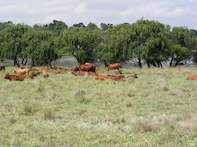
The livestock industry is crucial in sustaining the economy of this country as it contributes towards food security, economic and environmental stewardship as well as socio-cultural needs of society.
In an industry overview, the RPO in 2018 estimated that there were 13,6 million cattle in South Africa of which more than eighty percent was in possession of the emerging sector. The number of sheep was estimated at 24,6 million of which 13% was owned by the emerging sector, whereas the number of goats were estimated at 5,9 million of which 73% was owned by the emerging sector.
It was further estimated that there were 613 662 households in the emerging sector that owned cattle across South Africa. The Eastern Cape was the province with the highest number of household owners at 200 538, followed by KwaZulu-Natal with 169 534 household owners and then Limpopo with 91 562 household owners.
Sheep were owned by 215 034 households, while there were 429 065 households that owned goats.
The main restrictions experienced by emerging red meat producers throughout the country, ranges from the lack of access to productive land with adequate infrastructure and with good carrying capacity to high input costs which relate to animal feed and veterinary services as well as energy costs. Stock theft is another difficulty preventing these farmers from reaching their full potential.
Their situation is exacerbated by global warming and climate change in the form of recurrent droughts, animal disease outbreaks and now the recent Covid-19 pandemic, which are all making it increasingly difficult to break out of the poverty trap and make ends meet.